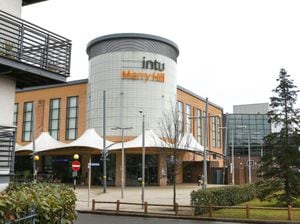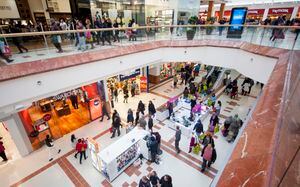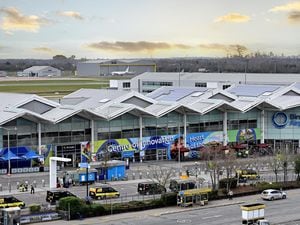Merry Hill owner intu plunges into red after fall in the value of its shopping centres
The owner of the intu Merry Hill shopping centre has crashed to a £500 million loss after the value of its 17 shopping centres was slashed.

The revaluation is a result of the decline in the UK's retail sector, which has seen a string of store chains closing hundreds of stores after going into administration or striking radical bailout deals.
The impact has wiped £650 million from the value of intu's 17 shopping centres compared to last summer, with £75 million cut from the value of the Merry Hill shopping centre.
Merry Hill also has the second highest rate of empty shops of any of the intu centres, with 6.6 per cent of them vacant – twice as many as at this time last year.
This is despite plans to pump £100 million into improving Merry Hill over the next few years, with a new cinema and new restaurants on the drawing board. Around £15 million is committed to work at the centre at the moment while a giant new Next store is about to open on the site of the centre's former Sainsbury's supermarket.
Intu's shares have slumped as a result of the loss and the company announcing the departure of its chief executive.

The shopping centre company made a £503.4 million loss in the six months to June 30, compared to a profit of £122.7 million during the same period of last year.
David Fischel, Intu's chief executive, will step down from the board when a successor has been found.
Mr Fischel was going to leave the company under a proposed merger with Hammerson, but the deal fell through in a dramatic knock for the firm.
The loss was due to a £650.4 million charge from a decline in value of its shopping centres, which include the Trafford Centre in Manchester and the Lakeside shopping centre in Essex. Together they are now valued at £9.8 billion. Merry Hill lost eight per cent of its value, down to £864 million, while centres in Derby, Watford and Nottingham were down by 11 per cent.
But the shopping centre owner underlined its commitment to its centres, currently spending £235 million of a £441 million long term pipeline of investment plans. It also pointed out it still gets around a million shoppers a day at its centres.
Analysts at Liberum said the pressure on Intu's shopping centres had been over and above that experienced by rivals Hammerson and Land Securities.
"The retirement of long-standing CEO David Fischel could present an opportunity for his successor to revisit the group's strategy and help improve the market's current poor perception of its assets and direction," they said.
Net rental growth was 1.3 per cent on a like-for-like basis over the period, with the company saying that it was unaffected by a string of store closures announced by retailers.
Intu's shares were down seven per cent at 167p by mid morning on the stock market.
Mr Fischel said: "During a period of weakening sentiment in the retail market, which has impacted prime shopping centre valuations, Intu has delivered a resilient operational performance in the first half of 2018.
"This reflects the high quality of our business which was able to perform in a challenging retail environment."





